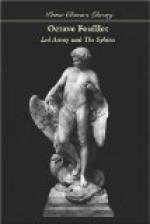He invited me to dinner, and in the evening, Madame Valton, after the usual struggles of expiring modesty, showed me, in her album, some views of the famous ruins sketched with considerable taste. She became mildly excited while speaking to me of these venerable remains, situated, if she is to be believed, in the midst of an enchanting site, and, above all, particularly well suited for picnics and country excursions. A beseeching and corrupting look terminated her harangue. It seems evident to me that this worthy lady is the only person in the department who takes any real interest in that poor old abbey, and that the conscript fathers of the general council have passed their resolution authorizing an investigation out of pure gallantry. It is impossible for me, however, not to concur in their opinion; the abbey has beautiful eyes; she deserves to be classed—she shall be classed.
My decision was therefore settled, from that moment, but it was still necessary to write it down and back it with some documentary evidence. Unfortunately, the local archives and libraries do not abound in traditions relative to my subject; after two days of conscientious rummaging, I had collected but a few rare and insignificant documents, which may be summed up in these two lines; “Rozel Abbey, in Rozel township, was inhabited from time immemorial by monks, who left it when it fell in ruins.”
That is why I resolved to go, without further delay, and ask their secret of these mysterious ruins, and to multiply, if need be, the artifices of my pencil, to make up for the compulsory conciseness of my pen. I left on Wednesday morning for the town of Vitry, which is only two or three leagues distant from the abbey. A Norman coach, complemented with a Norman coachman, jogged me about all day, like an indolent monarch, along the Norman hedges. When night came, I had traveled twelve miles and my coachman had taken twelve meals.
The country is fine, though of a character somewhat uniformly rustic. Under everlasting groves is displayed an opulent and monotonous verdure, in the thickness of which contented-looking oxen ruminate. I can understand my coachman’s twelve meals; the idea of eating must occur frequently and almost exclusively to the imagination of any man who spends his life in the midst of this rich nature, the very grass of which gives an appetite.




